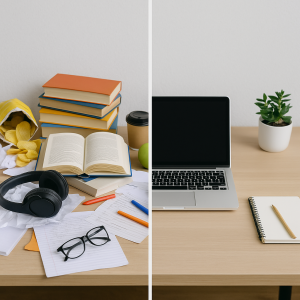 Most students underestimate the power of their surroundings. They focus on schedules, study techniques, and technology, but often overlook something just as important: their environment. A messy desk or cluttered room can quietly drain mental energy, while a clean, organized space can make studying feel easier and more productive.
Most students underestimate the power of their surroundings. They focus on schedules, study techniques, and technology, but often overlook something just as important: their environment. A messy desk or cluttered room can quietly drain mental energy, while a clean, organized space can make studying feel easier and more productive.
At home, where distractions are plentiful and self-discipline is tested daily, a clean study area becomes more than just a nice-to-have. It shapes how the brain processes information, how long students can focus, and even how motivated they feel to begin in the first place—something Janus Clean emphasizes in their approach to creating organized, clutter-free spaces.
The Mental Weight of Clutter
Clutter is not just physical—it’s psychological. Every object in sight competes for a slice of attention. Even if students think they’ve tuned it out, the brain still registers disorder in the background.
Researchers in cognitive psychology describe this as “visual noise.” The messier the environment, the more the brain has to work to filter distractions, leaving fewer resources for learning and problem-solving. This is why a student might feel restless, anxious, or mentally foggy when trying to study at a crowded desk.
A tidy space, on the other hand, reduces cognitive load. The brain doesn’t have to waste energy sorting through irrelevant stimuli, so attention can stay where it matters—on the task at hand.
Clean Spaces Improve Focus
Anyone who has tried to study with laundry on the chair, dishes in the sink, and papers scattered across the desk knows how quickly the mind wanders. A clean environment eliminates these competing reminders and helps create a sense of calm.
Psychologists often describe this as a “cue-controlled environment.” The setting signals the brain what to expect. When students walk into a neat, well-arranged study area, it sends a subtle message: this is a place for concentration and productivity. Over time, the brain associates that environment with learning, making it easier to slip into focus.
In contrast, cluttered areas blur the boundary between relaxation and work. If the same spot is used for eating, scrolling, and studying, the brain struggles to shift into study mode. Separating spaces—even within the same room—can help. Something as simple as keeping the desk clean and using it only for schoolwork creates a mental distinction.
The Link Between Cleanliness and Mental Health
The state of a room often mirrors the state of the mind. When the environment is chaotic, stress levels rise. On the flip side, order and cleanliness bring a sense of control. Tidying a desk, making the bed, or organizing notes can create small wins that improve mood and motivation. The act of cleaning itself can even serve as a stress reliever, offering a physical way to release tension before sitting down to focus.
For students balancing schoolwork with the pressures of daily life at home, this psychological boost matters. A clean space doesn’t just improve focus in the moment—it supports mental resilience over time.
Why Students Perform Better in Organized Study Areas
The connection between environment and performance is clear: organized spaces support better results. Here’s why:
- Less wasted time – With books, notes, and supplies in their proper place, students don’t lose focus hunting for what they need.
- Improved memory – The brain thrives on patterns. A structured environment reinforces order, which can spill over into more organized thinking.
- Higher motivation – Starting a study session in a neat space feels easier. The initial resistance is lower, so students are more likely to begin—and keep going.
- Sustained energy – A clutter-free environment reduces background stress, conserving mental energy for learning.
These factors combine into a powerful effect: students in organized environments are not only more efficient but also more consistent, which makes the biggest difference over time.
Practical Ways to Create a Productive Study Space at Home
Students don’t need a perfect setup or expensive equipment to benefit from a clean space. Simple changes can transform the home study environment:
- Clear the desk daily. End each session by putting books, pens, and devices in place. Waking up to a tidy desk makes starting easier.
- Use minimal décor. A few meaningful items are fine, but avoid overloading the study area with distractions.
- Keep supplies nearby. Having pens, paper, and chargers within reach reduces interruptions.
- Separate zones. If possible, dedicate one area to studying only. Even a small corner can serve as a “study zone” that signals focus.
- Add light and fresh air. A bright, ventilated space improves alertness and mood.
Final Thoughts
The psychology of clean spaces is simple: our surroundings shape our minds. For students learning at home, an organized study area is more than an aesthetic choice—it’s a tool for better focus, reduced stress, and stronger performance.
Small, consistent habits like clearing a desk or organizing supplies can have a big impact. Over time, these choices don’t just create a cleaner room. They make a clearer, calmer, and more capable mind—one that’s ready to learn.
